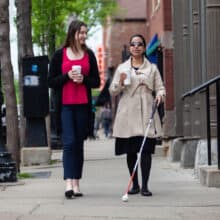
Top 5 Benefits of Hiring People with Disabilities
October 6, 2016
October is National Disability and Employment Awareness Month. During the entire month, numerous organizations and advocacy groups throughout the United States hold events to promote and educate employers about hiring of people with disabilities. Below are what many consider to be some of the many reasons and benefits of hiring and including people with vision loss or other disabilities in the workforce.
- People with disabilities are reliable employees and have an overall higher job retention rate.
Many studies have shown that people with disabilities take less absent days, and that they are more likely to stay on the job longer than non-disabled workers. Recently, The Chicago Lighthouse studied the retention rate of employees in its Illinois Tollway Customer Care Center, which employs people who are blind, visually impaired, disabled and Veterans (as well as people without disabilities.) On average, the employees with vision loss or other disabilities and Veterans had a retention rate of 1.7 years. In contrast, the retention rate for employees without disabilities or that were not Veterans was only 0.9 years.
- Employees with disabilities are less likely to get into work related accidents.
Two studies, one from the Department of Labor Statistics during the 1940s and a more recent one from the DuPont company concluded that workers with disabilities had a significantly higher performance in the area of safety than their counterparts without disabilities. In other words, employees with disabilities are more aware and conscientious of safety in the workplace. Both studies looked at different types of jobs, including labor, operational, managerial, clerical and service areas.
- Businesses that hire people with disabilities may receive tax credits or other incentives.
Eligible businesses can receive certain tax credits to aid them in hiring and accommodating workers with disabilities. Many of these credits are awarded for expenses incurred in things like purchasing adaptive equipment for workers with disabilities, or covering the costs of any modifications needed to make the building accessible. You can read more about the different types of tax credits and eligibility requirements on this page from the IRS.
- Workers with disabilities will increase diversity in the workplace.
Both workers with and without disabilities benefit equally from a diverse work setting. By working alongside employees with disabilities, individuals who are not disabled will become more aware about how to make the workplace and other settings more inclusive and accessible to everyone. They might consider things they had never thought of before, such as the accessibility challenges faced by people with disabilities. Employees with disabilities can also teach their coworkers about creativity and other ways to solve problems or accomplish different tasks.
- People with disabilities are as capable as anyone else!
This is the most simple, but difficult reason for employers to understand about hiring workers with disabilities. The unemployment rate for people with disabilities has constantly hovered at or above 70 percent, even 26 years after the passage of the ADA. Unfortunately, employers often refuse to hire individuals with disabilities, simply because they believe we are not capable of doing the job, or because they are unaware about the many adaptive techniques and devices that are available and allow us to work. Like anyone else, we apply to jobs we believe we are qualified for and capable of doing. If employers have doubts about if or how we will do a particular task, chances are that we have already thought about it and found a solution.
The following page lists common myths about hiring people with disabilities. What other reasons or benefits would you add to this list?

Sandy Murillo works at The Chicago Lighthouse, an organization serving the blind and visually impaired. She is the author of Sandy’s View, a bi-weekly Lighthouse blog about blindness and low vision. The blog covers topics of interest to those living with blindness and vision impairments. Being a blind journalist and blogger herself, Sandy shares her unique perspective about ways to live and cope with vision loss.






